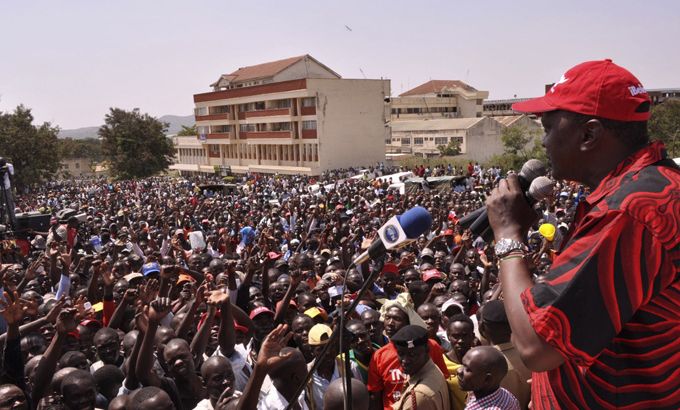Final preparations for Kenyan polls under way
Electoral commission sends notice on acceptable IDs at polling places as aid agencies stand by in case of violence.

Kenyan presidential hopefuls have made their final bids to woo voters for the tightly fought March 4 elections.
The Independent Electoral and Boundaries Commission (IEBC) cautioned voters that police abstracts and photo copies of identification documents will not be accepted during Monday’s vote.
“You will vote at the station where you were registered as a voter. The name of the station is indicated in your acknowledgement slip issued during registration,” a notice signed by Isaack Hassan, IEBC chairman, reads.
Elsewhere, aid agencies are preparing for possible post-election violence by training employees tactics for working in hostile environments.
On Sunday, the final day of campaigning, thousands of supporters danced to the tune of music in central Nairobi for rallies of the top two frontrunners, Raila Odinga, prime minister, and rival Uhuru Kenyatta, deputy prime minister.
At Nyayo national stadium, supporters of the prime minister, who has made three previous bids for the presidency, “will tell you categorically they think he will win outright”, said Al Jazeera’s Nazanine Moshiri of the attitude at the Odinga rally.
This certainty, said our correspondent, is due to the far-reaching base supporters of Odinga believe their candidate holds.
Supporters believe Odinga can secure the vote in the coastal city of Mombasa. As Odinga’s running mate, it is believed Kalonzo Musyoka can help him earn the eastern vote. The west, Odinga’s heartland, is also seen as going in his favour, said our correspondent.
At Uhuru Park, Kenyatta supporters were equally fervent in support of their candidate.
Al Jazeera’s Mohammed Adow, reporting from Uhuru Park, said “the crowd is getting thicker by the moment as people from all around Nairobi gather” to await the arrival of their preferred candidate.
ICC charges
Despite the overwhelming crowd of red at the park, our correspondent said Kenyatta supporters hoped their candidate would secure a clear majority of the votes to avoid a runoff.
“If the elections go to the second round, there is the likelihood of Odinga [triumphing],” said Al Jazeera’s Adow.
In 2007, more than 1,200 people died in post-election tribal violence. One of the candidates, Kenyatta, is being indicted by the international criminal court at the Hague for instigating the bloodshed.
Many think the ICC charges, which Kenyatta refutes, would destroy his bid, but on the contrary, the indictment has only helped galvanise support for him.
William Ruto, his running mate, among many Kenyans who see the charges as foreign meddling in domestic matters.
Tom Maliti, a Nairobi-based political analyst, said Kenyatta “spent easily 18 months campaigning on this issue and as he was campaigning at times he will put the fact that he is facing charges at the ICC right at the front, and at times put them at the back”.
“But from January 2011 to about May 2012 this was central to his bid for presidency and in essence he was mobilising his core constituency, the Kikuyu tribe, more than anything else.”
Whoever becomes president will have reduced powers and the national assembly and other institutions will have stronger power to check the presidency.